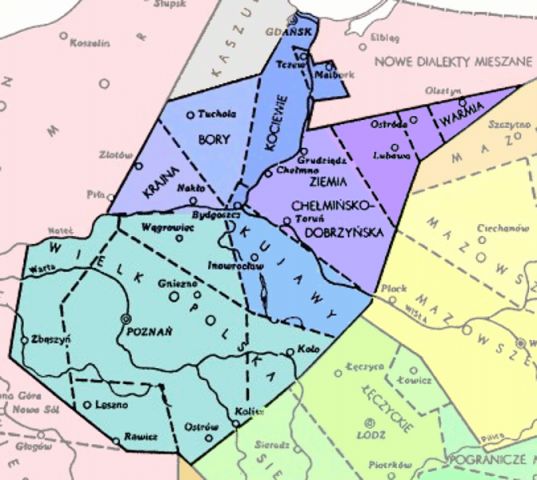Yes, I mostly agree with your post. But let's add something about the original Slavic population of Royal Prussia:michael mills wrote:The German-speaking population of Royal Prussia consisted partly of immigrants from Germany (the Holy Roman Empire) and partly of native Pomeranians who had become linguistically and culturally germanised. Which category the family of the mother of Copernicus belonged to I do not know; quite probably her family was a mixture of German immigrants and germanised Pomeranians.
But the most relevant point is that citizenship of the Royal Prussian towns was not dependent on an individual's descent, but on his linguistic and cultural status. Thus a person like the father of Copernicus who probably had no German ancestry could become a citizen of Thorn through his acquisition of German language and culture.
Of course, the rural population of Royal Prussia remained to a large extent ungermanised. German-speaking citizens of the Royal Prussian cities made a habit of sending their sons to live for a time in the surrounding villages to learn the local Polish dialect so that they could do business with Poland in future. So it is quite possible that Copernicus learned to speak a Polish dialect.
Pomeranians (Kaszubians) inhabited only one part of Royal Prussia to the west of Gdansk, while most of Slavic population of Royal Prussia were Greater Poles (Wielkopolans). Maps below show the extent and subdivisions of Greater Polish Dialect, next to Kashubian-speaking areas. Bory, Krajna and Kociewie were habitats of ethnographic groups of Borowiaks, Krajniaks and Kociewiaks - all of them subdivisions of Greater Poles, not Kashubians. Krajniak speech was Greater Polish but with strong Kashubian influence (it was an intermediary dialect). However, Borowiak and especially Kociewiak dialects did not show any significant Kashubian linguistic influences (see below).
After Gdansk became German-speaking Danzig, Kociewiaks still lived as far as the southern outskirts of Danzig, while Kashubians lived at its western outskirts. Before the Germanisation of Danzig, Slavic population of that area was probably a mixture of Kociewiaks and Kashubians (this map of dialects shows the border between Greater Polish and Kashubian running through the city):

Here Greater Polish dialect and its subdivisions is shown as III (also V is often counted as part of it - see above - but some linguists consider it to be a transitional dialect between Greater Polish and IV - Masovian), while Kashubian and its subdivisions is VI:

As for the origin of Kociewiaks (a subdivision of Greater Poles) - there are two theories on this. One theory says that they came there as settlers between the 10th and 12th centuries, another one says that they had lived there already before the 10th century.
I will translate posts describing both theories from "Kociewie - history of settlement" thread on historycy.org:
http://www.historycy.org/index.php?showtopic=82067
Question in the Opening Post:
"Welcome,
Contrary to Kashubia, Kociewie is a region inhabited by [Greater] Polish-speaking population. Does anybody know, when exactly did that settlement take place? Had that area once been inhabited by Kashubians, and only later Kociewiaks came?"
One of answers - by historian Adam Sengebusch (nickname Bazyli):
"This is a very hard question - some part of an answer can be found here: Wielkopolski Dialect - Kociewie Region (...) Some publications claim that south-eastern parts of Pomerelia were originally inhabited almost exclusively by Pomeranians (+ some small groups of Old Prussians). (...) Changes took place only after the conquest of Pomerelia by Poland [in the 10th century]. (...) During the reign of Boleslav III [in the 12th century] large part of population from Greater Poland, Cuiavia and Land of Dobrzyn started to migrated to southern and eastern parts of Pomerelia. The presence of Polish population in Pomerelia is confirmed without doubt by various sources from the 14th and 15th centuries (for example documents of Polish-Teutonic court trials from 1339). I will also remind that in another thread I quoted sources from the 14th and 15th centuries which say about presence in cities of Kociewie (such as Gniew / Mewe or Świecie / Schwetz) of Germans, Wends (most likely this refers to local Pomeranians) and Poles. I think that modern Kociewiaks emerged from a mixture of Poles and Polonized Pomeranians (+ groups of Prussians, Germans, and so on). An example of a native Kociewiak is Wojciech Cejrowski."
Kociewiak Cejrowski: https://en.wikipedia.org/wiki/Wojciech_Cejrowski
So according to Sengebusch, Kociewiaks are Medieval Polish settlers, who replaced (and partially assimilated) previous population - Kashubians. But another user - Kmat - says that Polish Kociewiaks lived there originally, and that Kashubians had never lived there. Quote:
"When it comes to Kociewie I would bet autochthonical [= pre-10th century] character. Primo - natural routes of settlement / migration go along the Vistula from Cuiavia and Mazovia to the north; secundo - Kashubian substrate is not visible in Kociewiak dialect, unlike in Krajna."
So, Kociewiak dialect is "pure" Wielkopolish - without any linguistic influence from Kashubian. This suggests no Kashubian substrate.
If Kmat is right then Kociewiaks could be the original Slavic population of the area of Danzig and areas to the south of it,
During Slavic migrations, dialectal differences between migrating groups emerged - but when did Kashubian and Wielkopolish emerge as two distinct kinds of speech from their common ancestral North-West Slavic (Lechitic) language, is uncertain. And it is uncertain where was their original border (i.e. who was first in the area which later became Free City Danzig - Kociewiaks, Kashubians, or both).